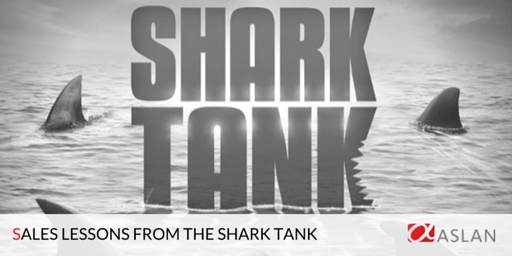Sales Lessons from the Shark Tank: How to Lure a Shark
By Sean Robertson
April 21, 2016
8 min read
"Budding entrepreneurs get the chance to bring their dreams to fruition in this reality show from executive producer Mark Burnett. They present their ideas to the sharks in the tank -- titans of industry who made their own dreams a reality and turned their ideas into lucrative empires. The contestants try to convince any one of the sharks to invest money in their idea."
 Welcome to the Shark Tank. The name itself just screams, “Inviting, cozy, and domesticated.”
Welcome to the Shark Tank. The name itself just screams, “Inviting, cozy, and domesticated.”
Most normal human beings would not choose to voluntarily subject themselves to shark-infested waters, invite the world to inspect their organizational birthmarks and scars, and expose themselves and their salesmanship on national television. But then again, no one ever called the entrepreneur “normal.”
Since 2009, entrepreneurs have jockeyed for the enviable opportunity to try to sway, convince, woo, and even wrestle one or more of these recognizable and potentially life-changing fish. Every entrepreneur that walks down the water-filled hallway and enters the doors of the Shark Tank has one common belief – the reward is worth the risk. In the end, the return on investment required to land one or more sharks who would be willing to infuse fiscal/mental/brand capital into their business in exchange for forfeiting some agreeable portion of their business, somehow sounds appetizing.
The reality is this type of selling engagement occurs every day, all across the sales world. Sales people are trying to find the perfect candidate for their product or service, and consumers and organizations are searching for solutions to give them a competitive advantage in the marketplace. It’s basically eHarmony or Match.com for business.
The real beauty behind Shark Tank is that someone finally agreed to create a reality show based on effective and ineffective selling strategies, and ABC has been giving free sales training on Friday nights for seven years. To prevent you from having to watch seven years of re-runs, here are the top three “lures” for getting a shark (or a customer) in your boat without personally becoming bait (yet another bad fishing analogy in this blog).
 Lure Number One – Preparation
Lure Number One – Preparation
The mandatory hook for catching a shark is preparation. If you walk into the tank unprepared, be prepared to be dismembered. Here are a few key areas to ensuring you are ready to dive in:
-
Know Your Sharks:
I am amazed at the number of entrepreneurs on the show who clearly demonstrate that they do not fully understand the profile of each shark. This becomes very clear as soon as the entrepreneur begins watching the shark’s decline their offer. They can’t clearly address a problem or need, and have no unexpected value proposition to the shark.
Unfortunately, this is a common scenario in the typical sales ecosystem as well. Take the time to get to know your audience and make it clear you know your customers and prospects. Review their personal and company LinkedIn profiles. Read the company’s press releases. Google the company. There is no excuse for not knowing who’s in the tank. Just a few things to consider when building a profile:
- Company overview
- Business environment
- Customer value proposition
- Current solutions
- Organizational structure
-
Demonstrate Your Expertise:
You have a matter of seconds to show that you are here to help them make money. I’m not talking about showcasing your commission breath with an explosive case of mouth diarrhea. I’m talking about concisely engaging and demonstrating your talent, skill, and knowledge.
- The talent necessary to find a way to win: Sharks can’t give you or teach you this. Talent is what you are born with —you have it or you don’t. You need to make sure they clearly understand and trust that you have it. Talent is usually the ante to be able to play with a shark. If you don’t come equipped with it, you might want to make sure you meet the prerequisites of preparation, quickness, thick skin, and be ready to nail the next two points.
- The skill required to make the sharks money, minimize risk, and take the right chances: The great thing about skill is that it can be taught and developed. The bad thing is that the sharks don’t typically have the time or interest to actually teach you. The same could be said for your customers. They may like your cool company logo design and flashy packaging, but this is not a charity gig. The sharks are in it to get their money back quick — with interest.
- The knowledge of your business: the market, the competition, the customer, the product, the costs, and all the options. If you don’t have it, start studying or stay home.
-
Prepare your Playbook:
You need to understand what winning looks like before you jump in the deep end. I am continuously amazed at the number of business owners on the show who are offered what they ask for and then stand there as if I hit the pause button on my DVR.
You have to create a playbook and know what to do and when to do it.You have to know exactly what you are looking for and why. This isn’t the time to get your Christmas wish list out and shoot for the moon. Quantify your “ask” in terms of measurable and quantifiable value. And when you get what you ask for, start shaking hands. Don’t stand around like you’re looking for your missing sock. Take the deal you wanted and go grow your business together. Greed kills deals, and sharks want to invest with confident and decisive entrepreneurs.
In the event that you aren’t getting what you want, you have to know what your “minimum” is. What is the drop-dead bottom deal that you are willing to take? While you are standing on stage is not the time to get out your abacus, phone a friend, or ask Siri what to do. Know your limits and have the courage to walk away from anything that is not a win/win.
 Lure Number Two — Receptivity
Lure Number Two — Receptivity
Sharks are like doors. They are either open or closed to what is being said. The issue is receptivity. The great thing about Shark Tank is that in the beginning, all the sharks are open and receptive when guests first walk through the doors. It’s what happens once they enter the tank and open their mouths that determine if they are making deposits or withdrawals in the sharks’ emotional accounts.The best shark tamers have a keen eye for making sure they are doing the right things to keep the sharks open, engaged, and receptive to their opportunity. The question is, “How do they do it?”
-
Be Other-Centered®:
Over 85 percent of the entrepreneurs who are fortunate enough to win a deal on Shark Tank have one common characteristic – they are hyper-focused on something other than themselves. They are either attuned with what each shark is looking for in a deal and in a partner (personally and professionally), or they are hyper-focused on a business that serves humanity in addition to making money. Either way, they are Other-Centered. When you add this to a winning ROI formula, sharks take the bait.
-
Ensure the Freedom to Choose:
The number one deal killer in the tank is arrogance. It’s kind of like giving someone satellite television and telling them they only have one channel to watch. By making sure, you acknowledge that every customer/prospect/shark always has options, and they are more than qualified to make their own choices, you increase receptivity.Entrepreneurs that experience the greatest success on the show (and the top performing sales professionals in the market) defuse the notion that sales is about control, and instead, always make sure the sharks knows they have the remote when it comes to making choices.
 Lure Number Three — Positioning
Lure Number Three — Positioning
What is it that the sharks are really buying? Are they looking for the right product, pitch, or the person? It may surprise you that one is most closely linked to their decision to actually invest. They see hundreds of great products every year, and hear twice as many pitches on why they should invest in everyone’s next best thing. Both of these have influence on their decision-making process, but in the end, the greatest influencer is the person. They invest in the people who can help them get what they want.
Consider the following. If a shark were to invest $1,000 in your product, your pitch, and in you as a person, on which of the three investments would they likely see the greatest return over the course of a year? Mr. Wonderful always likes to ask the question, “What keeps me from hiring three other people just like you and starting my own business doing the same thing – for a lot less money?” How many times has Mark Cuban said, “You’ve got a great product, but you don’t have a business yet.” The reason is the same. Product is replicable and pitches are just words. People are the currency that make business start, stop, and succeed.
Who wants to invest in a in a good product sold by a bad person that can’t back it up? In today’s competitive climate, who can afford to take on that burden and pain, in addition to the risk? No one. The job of entrepreneurs is to clearly demonstrate and position their abilities as people and as assets, not liabilities. The same is true for our clients and prospects. As consumers, we invest in people and products that solve our problems and address our needs. We partner with people that give us a better long-term perspective or position.
Here’s another way to look at it. The next time you find yourself negotiating with your three-year-old toddler over who gets the last donut, consider what you learned from Shark Tank and your positioning strategy. Do they really care about your product (a single chocolate covered donut)? Your pitch (“because you said so”)? Or the simple fact that you are one of the primary stakeholders in the family that happens to have possession of keys to a car, access to more than a few dimes in their piggy bank, and the competency to possibly drive to the donut shop and buy a dozen more? It’s all about positioning.
Next Friday night, find a television, grab some popcorn, and tune in to ABC at 9:00 p.m. Eastern. Keep this blog close by and see if you agree or disagree with what it takes to get a shark in the boat. And better yet, if you are a sales professional, try out one of these lures on your next sales call. Or let’s just get crazy and see if it works with family, friends, and life. In the end, we all swim with sharks at some point.
Please check out these other articles in our Shark Tank series:
Sales Lessons From The Shark Tank: Kevin O'Leary
Sales Lessons From The Shark Tank: Mark Cuban
Sales Lessons From The Shark Tank: Robert Herjavek
Unlock Your Team's Full Sales Potential
Questions? Watch our CEO, Tom Stanfill, address our frequently asked questions below.

